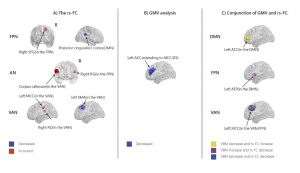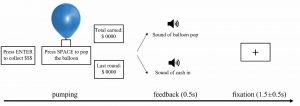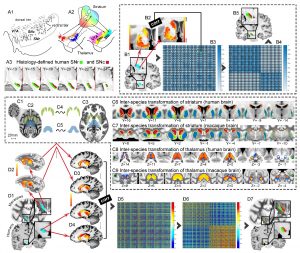A research team led by Yuan Zhen, professor at the Centre for Cognitive and Brain Sciences of the University of Macau (UM), has achieved significant advances in the research on behavioural addiction and decision making. They have developed methods to more accurately diagnose and treat behavioural addiction, and provided a scientific basis for the relevant prevention and intervention measures. The research results have been published in several internationally renowned journals and the findings have received notable attention in the field.
Behavioural addiction is a complex psychological and physiological phenomenon characterised by uncontrollable and compulsive repetitive behaviours, such as problem gambling and video game addiction, which have a negative impact on an individual’s daily life. The growing problem of behavioural addiction also represents an enormous challenge for society. However, the cessation and treatment of behavioural addiction still face numerous obstacles, such as the high relapse rate. Therefore, gaining a deeper understanding of the cognitive neural mechanism associated with behavioural addiction, such as changes in brain structure and functional networks, paves a new avenue for the diagnosis and treatment of behavioural addiction.
The study discovered that individuals with behavioural addictions have significant abnormalities in large-scale brain networks. In terms of functional connectivity, the research team identified abnormal connections in networks related to inhibitory control, reward, and self-referential processes. These abnormal connections might contribute to impaired responses to inhibition, significant attribution, and reward-driven behaviours. In terms of brain structure, the team found that individuals with behavioural addiction have reduced volumes of the prefrontal cortex, anterior cingulate cortex, and grey matter of the frontal gyrus, and that these structural changes are associated with addiction-related cognitive and emotional regulation. The research results have been published in the renowned journal Journal of Behavioral Addictions.
In addition to behavioural addiction, the research team also explored in depth the cognitive process of decision making. The study of decision-making behaviour can not only reveal individual characteristics of decision making but can also identify potential cognitive changes and brain intervention targets in patients with certain diseases. In particular, the study discovered that patients with chronic pain might exhibit more risk-taking behaviour. The abnormal prefrontal cortex (PFC) activity in patient groups might contribute to their inclination towards riskier decisions. The research results have been published in the renowned journal Neurophotonics.
Furthermore, the research team has made significant progress in mapping the cross-species connectome atlas of human and macaque striatum. Using magnetic resonance imaging (MRI) data from both species, they detected connectivity patterns that can achieve parcellation of striatal subregions of human and macaque at a macroscopic level based on intraspecies differences in brain regions and the similarities between homologous brain regions across species. The research team designed two cross-species connectome atlas based on structural and functional MRI modalities, and performed reliable partitioning analysis of key brain regions involved in addiction and decision making, such as the substantia nigra and striatum. The research team demonstrated the reliability of these partitions from multiple perspectives and pointed out that with these newly defined homologous striatal subregions rather than the traditional mapping methods, researchers can enable reliable localisation and subsequent investigations of addiction, decision making, and related topics at a multi-species level. The research results have been published in the internationally renowned journals Cerebral Cortex and Human Brain Mapping.
The research on behavioural addiction and decision making was led by Prof Yuan. Zeng Xinglin, PhD candidate at the Centre for Cognitive and Brain Sciences and the Faculty of Health Sciences of UM, was the first author. The two studies were both supported by the Science and Technology Development Fund of the Macao SAR (File no: 0048/2021/AGJ and 0020/2019/AMJ), the Education Fund of the Macao SAR (File no: CP-UMAC-2020-01), and the University of Macau (File no: MYRG2020-00067-FHS and MYRG2019-00082-FHS). The full version of the paper on decision making can be viewed at https://www.spiedigitallibrary.org/journals/neurophotonics/volume-10/issue-02/020901/Behavioral-modeling-and-neuroimaging-of-impaired-risky-decision-making-in/10.1117/1.NPh.10.2.020901.full?SSO=1.
The research on mapping the cross-species connectome atlas of human and macaque striatum was also led by Prof Yuan. Xia Xiaoluan, postdoctoral fellow at the Centre for Cognitive and Brain Sciences, was the first author. The study was supported by the Science and Technology Development Fund of the Macao SAR (File no: 0048/2021/AGJ and 0020/2019/AMJ), the Education Fund of the Macao SAR (File no: CP-UMAC-2020-01), and the University of Macau (File no: MYRG2020-00067-FHS and MYRG2019-00082-FHS). The full version of the paper can be viewed at https://academic.oup.com/cercor/article/33/12/7518/7078823 and https://onlinelibrary.wiley.com/doi/10.1002/hbm.26402.
| Source: Institute of Collaborative Innovation | |
| Media Contact Information: | |
| Communications Office, University of Macau | |
| Albee Lei | Tel: (853) 8822 8004 |
| Bell Leong | Tel: (853) 8822 8009 |
| Email: | prs.media@um.edu.mo |

(a)Changes in brain functional network; (b)changes in brain structure; (c)conjunction of changes in brain functional network and structure of individuals with behavioural addiction

A schematic of the modified balloon analogue risk task (BART)

Near-infrared spectroscopy neuroimaging reveals abnormal prefrontal cortex activation in chronic pain patients during decision-making tasks

(a)Striatonigrostriatal circuit architecture;(b)traditional single species parcellation of substantia nigra;(c)&(d) cross-species parcellation of human and macaque substantia nigra
